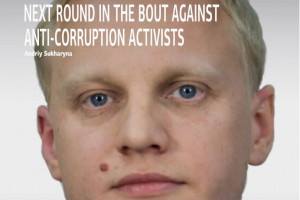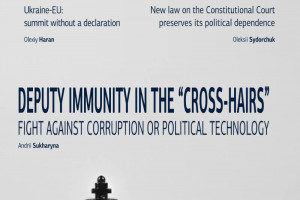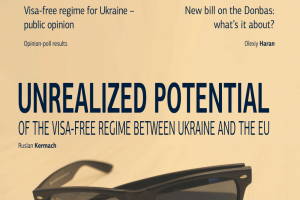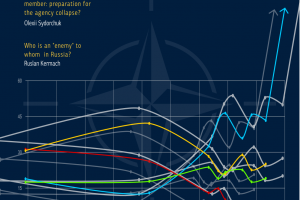“UNDER-BLOCKADE” OR THE CONSEQUENCES OF THE STRATEGY DISCORDANCE REGARDING THE OCCUPIED CRIMEA
І. Overviews of political events of the week
November |
Russia declared that it may review corresponding measures towards Ukraine regarding the power outage in Crimea. As is common knowledge, almost all of Crimea was left without electricity supply on November 20 due to the power outage on the territory of the Kherson oblast. The Mejlis of the Crimean Tatar People announced that the commodity and energy blockade of the occupied peninsula is a mechanism of influence on the aggressor country.
Crimean Tatars are prepared to withstand all the negative consequences of the blockade of Crimea for the sake of the reinstatement of the peninsula as a part of Ukraine, Deputy Head of the Mejlis Crimean Tatar People Ilma Umerov informed during a tele-marathon on Channel 5.
The Cabinet of Ministers of Ukraine banned the redirection of transport flows at the administrative border between Ukraine and Crimea upon the initiative of Premier Arseniy Yatsenyuk.
Premier Arseniy Yatsenyuk stated that Kyiv will reciprocate equally in the event that Russia imposes and embargo on the import of Ukrainian goods starting January 1, 2016.
November |
Activists blockading the energy supply to the occupied territory of Crimea will only agree to its renewal on condition that political prisoners on the peninsula and in Russia are released from jail, people’s deputy of Ukraine authorized on the matters of the Crimean Tatar people Mustafa Djemilev stated. So far, demonstrators permitted repair crews to only one line of electricity supply in order to avoid negative humanitarian consequences against Ukrainians and Tatars that live in Crimea.
November |
A group of people’s deputies from the Petro Poroshenko Bloc declared the formation of a new political union named the Anti-corruption Platform. Parliamentarians that are not satisfied with the current political situation joined the new formation. Among them are Viktor Chumak, Svitlana Zalishchuk, Serhiy Leshchenko, Mustafa Nayem, Yehor Firsov, Natalia Novak and others.
The Cabinet of Ministers approved the decision on the full closure of Ukrainian airspace for Russian airplanes, Premier Arseniy Yatsenyuk announced today at a meeting of the government. He said Russia could take advantage of Ukrainian airspace as a provocation.
Ukraine initiated a regime of silence and obligated to be the first to not open fire, Speaker of the General Headquarters Vladyslav Seleznyov informed. As he pointed out, in the Minsk Agreement it was agreed that a regime of silence will be introduced, meaning that the Armed Forces of Ukraine will not open fire. But in the event that targeted fire is opened against Ukrainian military positions, they have the right to open reciprocal fire on the front line.
US President Barack Obama signed the U.S. Defense Budget for 2016, which envisages military assistance to Ukraine to the tune of US $300 mn.
November |
After the holding of the referendum on the ratification of the EU-Ukraine Association Agreement the Netherlands will review its results, but it will not recall the agreement itself, Prime Minister of The Netherlands Marc Riutte informed at a joint press conference with Ukrainian President Petro Poroshenko in The Hague. As is known, The Netherlands intends to hold a referendum on ratification of the EU-Ukraine Association Agreement on April 6, 2016.
November |
The Tender Commission of Ukraine submitted to the Prosecutor General’s Office twocandidates for the post of Anti-Corruption Prosecutor – Maksym Hryshchuk and Nazar Kholodnytskiy.
Ukrenergo renovated one of the electric stations in the Kherson oblast, though protestors are blockading the renewal of electricity supply to Crimea. They are once again demanding from the occupants to free political prisoners. Ukrenergo informed that based on the results of the meeting between representatives of the company and participants of the blockade in Crimea, the energy companies will not have access to the line of electricity supply of Kakhovska-Titan at least for a week in order to continue repair works.
November |
Today Ukraine will commemorate victims of the Holodomor (The Great Famine), which historians estimate at 7-10 million. In the 20th century the Ukrainian people lived through three famines – 1921-1923, 1932-1933 and 1946-1947. The most devastating of them was the Great Famine of 1932-1933, which Ukrainians consider to be genocide against their people that was orchestrated by the totalitarian Communist regime under Joseph Stalin. Nationwide Mourning on Memorial Day to the Victims of Holodomor will be held all throughout Ukraine. At 16:00 hours Ukrainians will light candles on their window sills in all homes and in state institutions in memory of the victims and will hold a minute of silence in their honor.
November |
Local elections were held in two cities in the Donetsk oblast – Mariupol and Krasnoarmiysk – where citizens elected deputies of local councils and local heads.The OPORA citizens’ network informed that it did not observe gross violations in the course of the elections that would have an impact on their final results. As is known, the local elections were not held on the earlier date set for October 25.
In Kryviy Rih a second people’s council was held in protest of the election of Yuriy Vilkul as the local head of the city. The protestors approved a decision to not acknowledge the results of the elections that were falsified and appealed to the Verkhovna Rada with a request to set a date for the holding of repeat elections.
“UNDER-BLOCKADE” OR THE CONSEQUENCES OF THE STRATEGY DISCORDANCE
REGARDING THE OCCUPIED CRIMEA
On the evening of November 20, as a result of the blasting of high-voltage lines in the Kherson oblast electricity supply to the occupied territory of Crimea were completely cut off. The “Ukrenergo” national electricity company noted that the damages to electrical power lines were probably due to the use of explosive substances. The police have already filed four criminal cases on the fact of sabotage. Meanwhile, the activists of the product blockade of Crimea in the Kherson oblast are impeding the work of the repair crew of “Ukrenergo” at locations of electrical power supply damage and are putting forth political demands to the occupation authorities of Crimea regarding the release of political prisoners as a condition for the renewal of electricity supply.
Law enforcement bodies must give their final word regarding those guilty in the acts of sabotage. However, there are currently solid grounds to presume the complicity of the Crimean Tatar activists in the blasting of the high-voltage lines in the Kherson oblast, which have for more than three months orchestrated the so called product blockade of the Crimean peninsula. The current measures taken by activists and aimed at preventing the possibilities of renewal of electrical lines (accordingly the supply of electricity to Crimea) as well as the demands of leaders of the Crimean Tatar people to start a full-scale energy blockade of the peninsula that they voiced earlier might indirectly point to the probable involvement of the product blockade activists in the recent acts of sabotage. Their highly radical actions could be dictated, among other things, by the insufficient efficiency of the product blockade currently being conducted, which as the data of certain economic studies show, have not led to the substantial aggravation of the socio-economic situation on the occupied peninsula that activists were expecting.[1]
In any case, the resonant incident of the blasting of electrical power line in the Kherson oblast the week before is a clear testimony to the extraordinary high-risk level of such situations when civil activists and official Ukrainian governmental bodies do not coordinate their approaches and strategies regarding such a complicated issue as a policy regarding the occupied territory of Crimea. Indeed, as it is known, the idea of a product blockade of Crimea was inbred in the environment of civil activists; however it was not formalized at the level of the state policy of Ukraine regarding Crimea. At the same time, since the product blockade started the Ukrainian government over its time did not in any way obstruct the repercussions of the acts of Crimean Tatar activists, which gave grounds to speak about official Kyiv’s clandestine approval of the blockade. As such, this allows speaking about the peculiar hybrid nature of the product blockade. On the one hand, such a format gave the official Ukrainian leadership certain tactical advantages in avoiding negative perceptions of Ukraine by residents of Crimea while the Crimean Tatar activists took the main blow to their image and reputation. However, strategically the “silent approval but formal non-complicity” approach of Ukrainian government proved its short-sightedness when, as a result of the execution of the act of sabotage, official Kyiv itself had to bear the brunt of political responsibility for this resounding incident, particularly on the international level.
It is quite clear that there is a substantiated and rational component in the recent radical acts of the activists (or at the very least in their support of such acts) that is associated with the conviction of the need for the application of maximum stringent acts against the occupation government of Russia in Crimea. Within the framework of this paradigm the guarantee of supply of electricity to the occupied peninsula appears to be an absolutely irresponsible and inconsistent policy. On the flipside, the energy blockade from the vantage point of the blockade activists is intended to profoundly raise the cost for the occupation Russian government to further maintain the annexed peninsula “on the balance”.
Of course, such an approach, though somewhat logical and substantiated, extremely simplifies the versatility and complexity of the problem associated with the supply of energy to Crimea. At the same time representatives of the authorities in Kyiv must take into account this complexity. The potential and absolutely real risks associated with a spontaneous energy blockade of Crimea lie simultaneously in several dimensions: energy, security, political and social-humanitarian.
First of all, as a result of the fall of electricity power lines in the Kherson oblast, two blocs of the Ukrainian thermo-electric station (TES) had to be disconnected from the electrical network and the emergency unloading of two Ukrainian Nuclear Power Plants (Zaporizhzhya and Pivdennoukrainsk NPP) was done, which potentially could have led to threatening consequences, including potential technogenic (ecological) disaster. Secondly, as a result of the energy blockade in Crimea there is a serious and absolutely tangible threat to the energy security of Ukraine. Indeed, in connection with the cutting off of energy supply to the Crimean peninsula Russia has suspended the shipping of anthracite coal to Ukraine necessary to maintain the operation of at least seven Ukrainian TES and which Ukraine lacks substantially after the loss of control over some areas of Donetsk and Luhansk regions.
Additional risks are also associated with the need for Ukraine to pass the heating season, which may also be under threat if Moscow applies possible counter-measures (cutting the supply of gas) in response to the forced suspension of supply of electricity to Crimea. Alongside, it is absolutely not ruled out that Russia could exploit the current situation with the energy blockade of Crimea as a pretext for further intensification of military actions in the Donbas region through the Moscow-controlled DPR/LPR proxies.
The socio-humanitarian factor of perception of residents of the Crimean peninsula, among which there are many Ukrainians, is no less important in the context of the notion of the energy blockade of Crimea. In light of this if the Ukrainian government indeed plans in the future to renew sovereignty over the territory of the currently occupied Crimean peninsula, then one way or another it must take into consideration the moods of people in Crimea, as well as the potential losses of Ukraine in terms of image and reputation as a result of implementing/supporting the scenario of a full-scale energy blockade. Clearly, the introduction of blatantly non-humane measures that among other things may pose a threat to the lives of people will not inure to the benefit of Ukraine’s reputation, both in Crimea and on the international arena.
In the context of international perception of Ukraine the situation around the energy sabotage in the Kherson oblast also carries tangible risks for the country. Indeed, in light of the incident with the cutting off the electricity power supply lines European partners of Ukraine might be concerned about the capability of the Ukrainian leadership to control the situation in the country and, specifically, its capacity to ensure, for instance, uninterrupted supply of gas that its mainly transited through the territory of Ukraine.
Conclusions
So, the recent situation with the cutting off of electricity supply lines in the Kherson oblast and the corresponding cut-off of the territory of Crimea from energy supply is testimony to the serious level of risk of the situation with the mismatch between civil society (activists) and the official state strategy regarding the occupied territory of the peninsula. Such a strategy should definitely take into account the whole spectrum of potential security, economic, political, socio-humanitarian and reputational risks for Ukraine outlined above and should also cohere with the key demands and interests of the main stakeholders of the new policy (including demands of the Crimean Tatar activists). Such a strategy should be implemented at the level of official state as a subject bearing political responsibility for its actions and in compliance with long-term and clearly delineated priorities of Ukraine regarding the occupied territory of Crimea.
[1] The Blockade of Crimea: Is it Working? // VoxUkraine. 2015. 11 November. URL: http://voxukraine.org/2015/11/11/the-blockade-of-crimea-is-it-working/
“Focus оn Ukraine” – weekly informational-analytical news bulletin prepared by the Ilko Kucheriv Democratic Initiatives Foundation (http://dif.org.ua).
DIF Analysts:
Iryna Bekeshkina
Oleksiy Haran
Ruslan Kermach
Oleksiy Sydorchuk
Maria Zolkina
Editor-in-chief: Iryna Filipchuk








